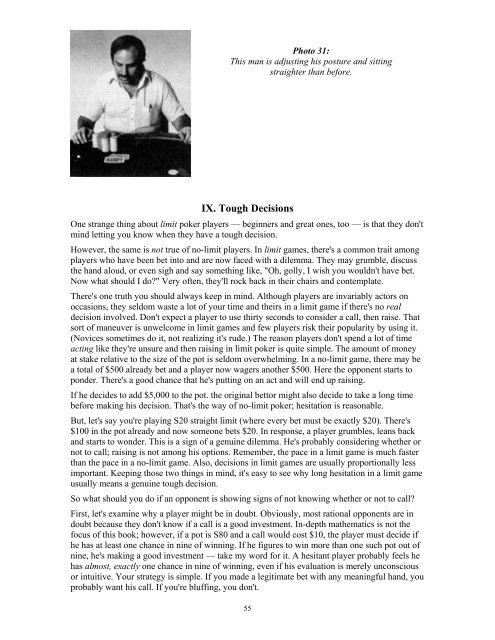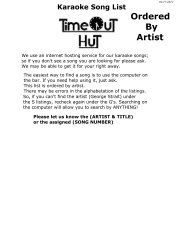+Mike Caro - Caros Book Of Poker Tells.pdf - Time Out Hut
+Mike Caro - Caros Book Of Poker Tells.pdf - Time Out Hut
+Mike Caro - Caros Book Of Poker Tells.pdf - Time Out Hut
You also want an ePaper? Increase the reach of your titles
YUMPU automatically turns print PDFs into web optimized ePapers that Google loves.
Photo 31:<br />
This man is adjusting his posture and sitting<br />
straighter than before.<br />
IX. Tough Decisions<br />
One strange thing about limit poker players — beginners and great ones, too — is that they don't<br />
mind letting you know when they have a tough decision.<br />
However, the same is not true of no-limit players. In limit games, there's a common trait among<br />
players who have been bet into and are now faced with a dilemma. They may grumble, discuss<br />
the hand aloud, or even sigh and say something like, "Oh, golly, I wish you wouldn't have bet.<br />
Now what should I do?" Very often, they'll rock back in their chairs and contemplate.<br />
There's one truth you should always keep in mind. Although players are invariably actors on<br />
occasions, they seldom waste a lot of your time and theirs in a limit game if there's no real<br />
decision involved. Don't expect a player to use thirty seconds to consider a call, then raise. That<br />
sort of maneuver is unwelcome in limit games and few players risk their popularity by using it.<br />
(Novices sometimes do it, not realizing it's rude.) The reason players don't spend a lot of time<br />
acting like they're unsure and then raising in limit poker is quite simple. The amount of money<br />
at stake relative to the size of the pot is seldom overwhelming. In a no-limit game, there may be<br />
a total of $500 already bet and a player now wagers another $500. Here the opponent starts to<br />
ponder. There's a good chance that he's putting on an act and will end up raising.<br />
If he decides to add $5,000 to the pot. the original bettor might also decide to take a long time<br />
before making his decision. That's the way of no-limit poker; hesitation is reasonable.<br />
But, let's say you're playing S20 straight limit (where every bet must be exactly $20). There's<br />
$100 in the pot already and now someone bets $20. In response, a player grumbles, leans back<br />
and starts to wonder. This is a sign of a genuine dilemma. He's probably considering whether or<br />
not to call; raising is not among his options. Remember, the pace in a limit game is much faster<br />
than the pace in a no-limit game. Also, decisions in limit games are usually proportionally less<br />
important. Keeping those two things in mind, it's easy to see why long hesitation in a limit game<br />
usually means a genuine tough decision.<br />
So what should you do if an opponent is showing signs of not knowing whether or not to call?<br />
First, let's examine why a player might be in doubt. Obviously, most rational opponents are in<br />
doubt because they don't know if a call is a good investment. In-depth mathematics is not the<br />
focus of this book; however, if a pot is S80 and a call would cost $10, the player must decide if<br />
he has at least one chance in nine of winning. If he figures to win more than one such pot out of<br />
nine, he's making a good investment — take my word for it. A hesitant player probably feels he<br />
has almost, exactly one chance in nine of winning, even if his evaluation is merely unconscious<br />
or intuitive. Your strategy is simple. If you made a legitimate bet with any meaningful hand, you<br />
probably want his call. If you're bluffing, you don't.<br />
55



